In comparison to previous years (2013, 2015, 2019a,) the BBC’s coverage of Israel’s last three elections (2019b, 2020, 2021) was less prolific. That trend continued as Israelis once again went to the polls on November 1st 2022.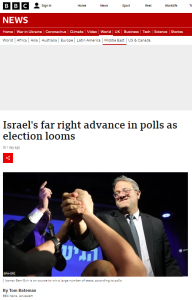
The BBC News website published a total of six reports relating to the election:
October 29th: ‘Israel’s far right advance in polls as election looms’ Tom Bateman (discussed here)
November 1st: ‘Israel election: Netanyahu seeks comeback as country votes’ Yolande Knell
November 2nd: ‘Israel elections: Netanyahu set for comeback with far right’s help – partial results’ Raffi Berg
November 2nd: ‘Benjamin Netanyahu, Israel’s comeback leader’ Raffi Berg (see changes here)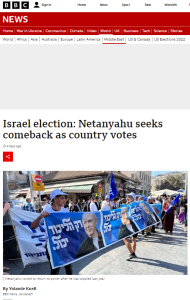
November 2nd: ‘Israel elections: Netanyahu election win propels far right to power’ Yolande Knell (see changes here)
November 3rd: ‘Israel elections: Outgoing PM Lapid congratulates Netanyahu on victory’ David Gritten
By way of comparison, in 2013 the BBC News website published thirty-four reports about the election and ahead of the first election in 2019, fifteen articles were published before voting even began.
As can be understood from those headlines and the accompanying chosen images, BBC coverage of the 2022 election overwhelmingly focused audience attentions on just two contenders: Binyamin Netanyahu and Itamar Ben Gvir.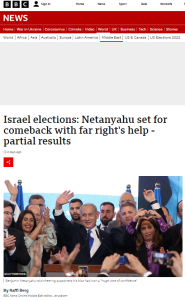
Audiences were not provided with any information about the vast majority of the thirty-nine lists running in the election and their platforms. Issues of interest to Israeli voters such as the cost of living, housing and crime within Israeli-Arab communities were completely ignored by the BBC’s journalists, who also failed to provide the corporation’s world-wide audience with any information about how the Israeli electoral system works.
The November 3rd report about the final results of the election did not inform readers that the Meretz party and the Balad party failed to cross the electoral threshold.
Most of the BBC’s six reports include links to or quotes from outside contributors (Israel Democracy Institute, Hebrew University, a pollster) and/or from journalists (Axios, Jerusalem Post, Walla!, +972 Magazine, Ha’aretz).
In the two reports by Yolande Knell readers find heavily veiled references to the ongoing wave of Palestinian terrorism without any serious analysis of how that may have influenced voting patterns: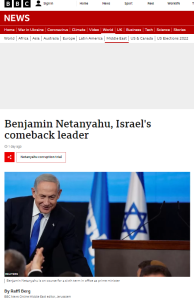
“As with the previous four inconclusive elections, this looks like a referendum on Mr Netanyahu rather than a vote on Israel’s top security and diplomacy issues, notably Iran’s nuclear ambitions and the conflict with the Palestinians.
That is despite an increase in deadly violence in the occupied West Bank ahead of election day.”
“His [Lapid’s] tenure also saw the deadliest year for Israelis and Palestinians since 2015, amid an upsurge in violence. Yet his government continued to pay little attention to ways of solving the Israel-Palestinian conflict.”
Notably, none of the BBC’s reports make any reference to the May 2021 rioting in Israeli cities such as Acco and Lod and the later violence in parts of the Negev which some observers think also influenced voters in this election.
As has been the case in previous years, BBC coverage of Israel’s latest election once again failed to provide audiences with a broad perspective, thereby hampering their ability to fully comprehend the story.
Related Articles:
BBC WS EXPLOITS ISRAEL ELECTION TO PROMOTE POLITICAL NGO’S TALKING POINTS

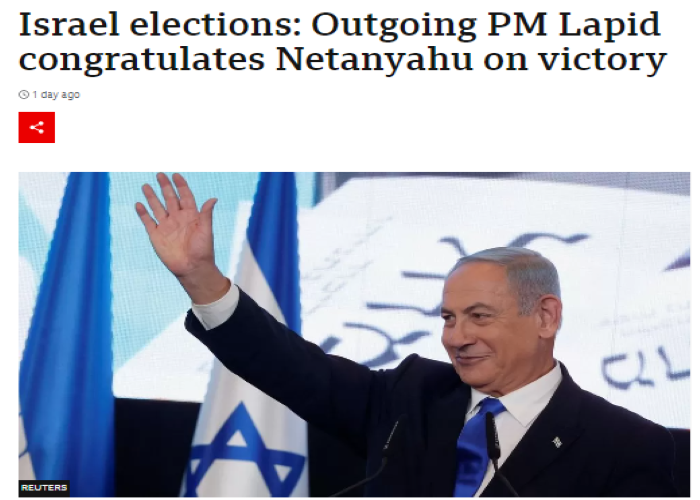
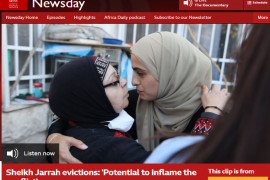
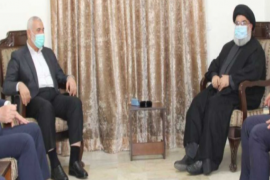

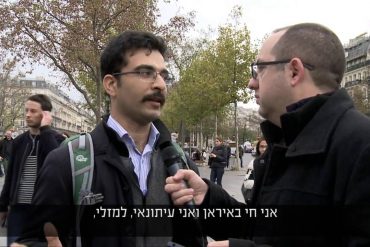
It is strange that elections in other countries worldwide are NOT covered by the BBC period. So, we have to ask why the BBC has an obsession with Israel.
A quick Google search regarding the elections in Lebanon yielded the following and speaks for itself on the BBC’s obsession with Israel:-
Lebanon election results raise spectre of new power strugglehttps://www.bbc.com › world-middle-east-61476714
17 May 2022 — BBC News, Beirut. For three months in 2019, revolution crackled around the streets of Lebanon like electricity. This fractured country had …
Lebanon election: Hezbollah and allies lose parliamentary …https://www.bbc.com › world-middle-east-61463884
17 May 2022 — The Iran-backed group suffers a setback in the first elections since mass anti-government protests.
Can Lebanon’s elections get the country out of crisis? – YouTubehttps://www.youtube.com › watch
PREVIEW
3:46
Lebanon, a country in crisis with about 80% of its people living in poverty, according to the UN, will go to the polls on Sunday.
YouTube · BBC News · 13 May 2022
The BBC has an obsession with Israel because its editing staff has succumbed to infiltration by arabists and antisemites. Twas ever thus.